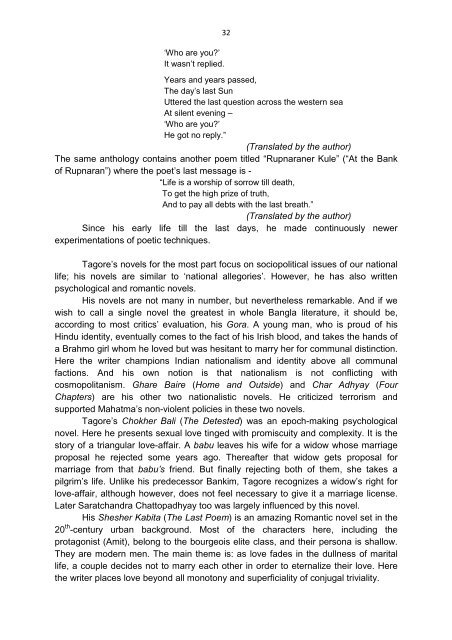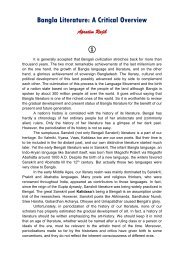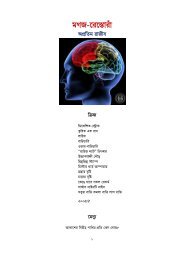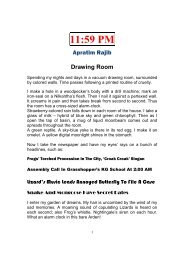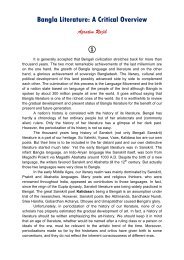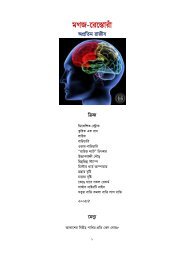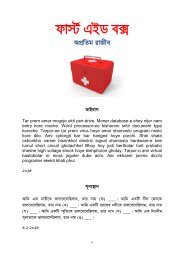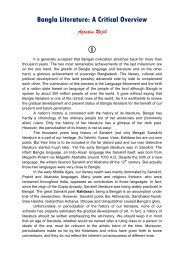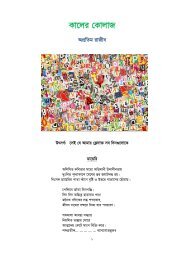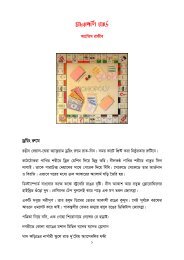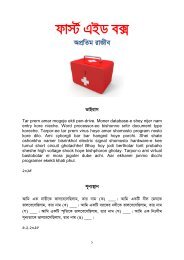BLiterature-Apratim
Create successful ePaper yourself
Turn your PDF publications into a flip-book with our unique Google optimized e-Paper software.
‘Who are you?’<br />
It wasn’t replied.<br />
32<br />
Years and years passed,<br />
The day’s last Sun<br />
Uttered the last question across the western sea<br />
At silent evening –<br />
‘Who are you?’<br />
He got no reply.”<br />
(Translated by the author)<br />
The same anthology contains another poem titled “Rupnaraner Kule” (“At the Bank<br />
of Rupnaran”) where the poet’s last message is -<br />
“Life is a worship of sorrow till death,<br />
To get the high prize of truth,<br />
And to pay all debts with the last breath.”<br />
(Translated by the author)<br />
Since his early life till the last days, he made continuously newer<br />
experimentations of poetic techniques.<br />
Tagore’s novels for the most part focus on sociopolitical issues of our national<br />
life; his novels are similar to ‘national allegories’. However, he has also written<br />
psychological and romantic novels.<br />
His novels are not many in number, but nevertheless remarkable. And if we<br />
wish to call a single novel the greatest in whole Bangla literature, it should be,<br />
according to most critics’ evaluation, his Gora. A young man, who is proud of his<br />
Hindu identity, eventually comes to the fact of his Irish blood, and takes the hands of<br />
a Brahmo girl whom he loved but was hesitant to marry her for communal distinction.<br />
Here the writer champions Indian nationalism and identity above all communal<br />
factions. And his own notion is that nationalism is not conflicting with<br />
cosmopolitanism. Ghare Baire (Home and Outside) and Char Adhyay (Four<br />
Chapters) are his other two nationalistic novels. He criticized terrorism and<br />
supported Mahatma’s non-violent policies in these two novels.<br />
Tagore’s Chokher Bali (The Detested) was an epoch-making psychological<br />
novel. Here he presents sexual love tinged with promiscuity and complexity. It is the<br />
story of a triangular love-affair. A babu leaves his wife for a widow whose marriage<br />
proposal he rejected some years ago. Thereafter that widow gets proposal for<br />
marriage from that babu’s friend. But finally rejecting both of them, she takes a<br />
pilgrim’s life. Unlike his predecessor Bankim, Tagore recognizes a widow’s right for<br />
love-affair, although however, does not feel necessary to give it a marriage license.<br />
Later Saratchandra Chattopadhyay too was largely influenced by this novel.<br />
His Shesher Kabita (The Last Poem) is an amazing Romantic novel set in the<br />
20 th -century urban background. Most of the characters here, including the<br />
protagonist (Amit), belong to the bourgeois elite class, and their persona is shallow.<br />
They are modern men. The main theme is: as love fades in the dullness of marital<br />
life, a couple decides not to marry each other in order to eternalize their love. Here<br />
the writer places love beyond all monotony and superficiality of conjugal triviality.


